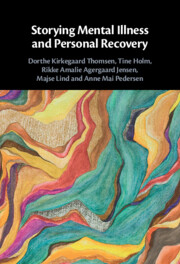Book contents
- Storying Mental Illness and Personal Recovery
- Storying Mental Illness and Personal Recovery
- Copyright page
- Contents
- Figures
- Tables
- Acknowledgments
- Chapter 1 Introducing the Book
- Chapter 2 The Science of Mental Illness
- Chapter 3 Vulnerability, Stress, and Burden in Mental Illness
- Chapter 4 Recovery and Mental Illness
- Chapter 5 Narrative Identity
- Chapter 6 Narrative Identity, Illness, and Well-Being
- Chapter 7 How Did We Collect and Analyze the Life Stories?
- Chapter 8 Overview of Narrative Identity Themes from the Initial Analyses
- Chapter 9 Relationship Themes in Narrative Identity
- Chapter 10 Self Themes in Narrative Identity
- Chapter 11 Functional-Level Themes in Narrative Identity
- Chapter 12 Treatment Themes in Narrative Identity
- Chapter 13 Summary and Synthesis
- Chapter 14 Understanding the Interplay between Narrative Identity and Mental Illness: A Framework
- Chapter 15 Tools for Narrative Repair
- Conclusion
- Book part
- References
- Index
Chapter 5 - Narrative Identity
Published online by Cambridge University Press: 02 February 2023
- Storying Mental Illness and Personal Recovery
- Storying Mental Illness and Personal Recovery
- Copyright page
- Contents
- Figures
- Tables
- Acknowledgments
- Chapter 1 Introducing the Book
- Chapter 2 The Science of Mental Illness
- Chapter 3 Vulnerability, Stress, and Burden in Mental Illness
- Chapter 4 Recovery and Mental Illness
- Chapter 5 Narrative Identity
- Chapter 6 Narrative Identity, Illness, and Well-Being
- Chapter 7 How Did We Collect and Analyze the Life Stories?
- Chapter 8 Overview of Narrative Identity Themes from the Initial Analyses
- Chapter 9 Relationship Themes in Narrative Identity
- Chapter 10 Self Themes in Narrative Identity
- Chapter 11 Functional-Level Themes in Narrative Identity
- Chapter 12 Treatment Themes in Narrative Identity
- Chapter 13 Summary and Synthesis
- Chapter 14 Understanding the Interplay between Narrative Identity and Mental Illness: A Framework
- Chapter 15 Tools for Narrative Repair
- Conclusion
- Book part
- References
- Index
Summary
In Chapter 5, we present the defining characteristics of narrative, including temporal organization, protagonists pursuing goals, the landscapes of action and consciousness, and meaning as emerging from configuration of events. We argue that experience takes on certain of these defining features (lived story) and that telling stories is anchored in while also transforming lived story. We introduce narrative as crucial to identity since it supports self-continuity by organizing past, present, and future selves into coherent patterns. Further, we describe the memory, imagination, and reflection processes involved in the creation of narrative identity. Finally, we locate narrative identity in social and cultural contexts by introducing the concept of narrative ecology, which includes stories shared by others (vicarious stories), social scaffolding of storytelling, culturally shared stories, such as autobiographies, and master narratives. We discuss how a negative narrative ecology may play a role in shaping narrative identity in some individuals with psychopathology, including negative master narratives of mental illness, inaccurate stereotypes, silencing, absent or hostile coauthors, and lack of adaptive vicarious life stories.
Keywords
- Type
- Chapter
- Information
- Storying Mental Illness and Personal Recovery , pp. 53 - 67Publisher: Cambridge University PressPrint publication year: 2023



